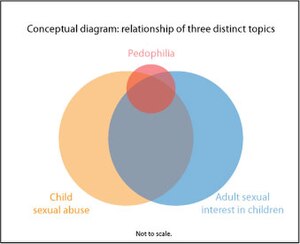 By Jean F. Andrews
By Jean F. Andrews
Is there a connection between early child abuse and adult criminal behavior among deaf and hard of hearing persons?

Among more than 1,400 adult females, childhood sexual abuse was associated with increased likelihood of drug dependence, alcohol dependence, and psychiatric disorders. The associations are expressed as odds ratios: for example, women who experienced nongenital sexual abuse in childhood were 2.93 times more likely to suffer drug dependence as adults than were women who were not abused. (Photo credit: Wikipedia)
While exact statistics on this question are hard to find, from 10 cases of deaf youths in juvenile facilities around the country, it was found that 6 out of the 10 were abused by a parent, a relative or a by a neighbor. The deaf youths in turn physically or sexually abused a younger child then found themselves in a juvenile corrections facility. Thus, at one end of the spectrum we have deaf children who were physically, emotionally, communicatively and sexually abused. When they became youth and adults they act out by aggressively and physically bullying or assaulting or sexually molesting younger children.

English: Conceptual diagram showing relationship between adult sexual interest in children, pedophilia, and child sexual abuse. These distinct concepts overlap, but academics and clinicians consider them separate. (Photo credit: Wikipedia)
At the core are two key issues according to Dr. Harold Johnson, professor of special education at Michigan State University. In his research he has found that deaf children often do not have the ability to report the abuse because they do not have the language skills. In addition, caring adults, particularly teachers around them lack of awareness to pick up on the cues of the abused child.
According to Dr. Johnson, awareness and building a knowledge base about childhood abuse is critical for teachers and teacher-educators. Dr. Johnson, a professor of special education in Michigan State University’s Department of Counseling, Educational Psychology, and Special Education has focused his research, training and writing on how web-based technologies and resources can be used to reduce isolation, facilitate collaboration, recognize excellence, and enhance teaching/learning within K–20 deaf education. He also has investigated the maltreatment of children with disabilities, particularly those with hearing losses.

The grave of Lisa Launders. On November 1, 1987, Joel Steinberg delivered several blows to Lisa’s head and then he and Hedda Nussbaum waited over 12 hours to call for help. Lisa did not die that day, she died three days later from severe brain injuries. (Photo Credit: Wikipedia)
Dr. Johnson has provided outstanding resources for schools, administrators, parents and families to address the heinous crime of the abuses of children who are deaf and hard of hearing. Such work can lead to preventive measures that have the potential of curtailing the growth of deaf adults in jails and prisons who after being victims as children, become the victimizers as adults.
***
Dr. Johnson’s resources are:
http://deafed-childabuse-neglect-col.wiki.educ.msu.edu/Presentations
Protecting the Most Vulnerable From Abuse
http://www.asha.org/Publications/leader/2012/121120/Protecting-the-Most-Vulnerable-From-Abuse.htm
The Risk & Prevention of Maltreatment of Children w/Disabilities
https://www.childwelfare.gov/pubs/prevenres/focus/pdf
http://www.handsandvoices.org/resources/OUR/Index.htm
http://deafed-childabuse-neglect-col.wiki.edu.msu.edu/Bright+Spot+-+Home+Page.
***
At the other end of the spectrum are the deaf children and youth who do not receive proper treatment and end up as adults in the criminal justice system. If not appropriately rehabilitated, they become repeat offenders and as adults, they are incarcerated in Federal or state prisons where interpreters and accessible rehabilitative services may not be provided. Most of these deaf adults have low reading levels and low signing levels which further compounds their difficulties in prison and getting their Constitutional Rights in court.
If teachers, interpreters, social workers, counselors and psychologists-in-training could see both ends of the spectrum—Dr. Johnson’s work on child abuse preventive measures and www.deafinprison.com’s work on deaf adults who fall through the cracks and become adult offenders, then professors in teacher-education and other professional programs could make a significant contribution in educating the next generation of professionals in prevention, and when prevention fails, to care for the victims and victimizers beyond the school yard.
Jean F. Andrews is a Reading Specialist and Professor of Deaf Studies/Deaf Education at Lamar University.
Related articles
- Promises Made, Promises Broken (deafinprison.wordpress.com)
- Your Money or Your Life (deafinprison.wordpress.com)
- Downton Abbey’s Jim Carter Demands Action Over Deaf Services Cuts (contactmusic.com)
- Communicating with a D/deaf Child (earlylearninghq.org.uk)
- How Can *You* Stop Hearing Loss Bullying? (lipreadingmom.com)
- GCSEs: Big council cuts hit deaf pupils’ grades (mirror.co.uk)


